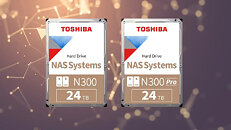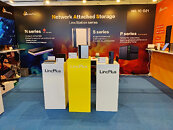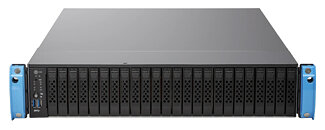
Toshiba Adds 24TB Capacity to N300 and N300 Pro Internal Hard Disk Drive Series
Toshiba Electronic Devices & Storage Corporation ("Toshiba") has announced the addition of new 24 TB models to both its N300 and N300 Pro Series of internal hard disk drives (HDD). The new models offer 2 TB more capacity than current 22 TB versions, making them ideal for increasing the capacity of network attached storage (NAS) and private cloud storage. They are designed for 24/7 operation, feature industry-standard 3.5-inch 7200rpm, 1 GiB buffer, and include integrated sensors to compensate for rotational vibrations.
The N300 Series has a workload rating of up to 180 TB/year with support for up to 12 drive bays, while the N300 Pro Series boasts a workload rating of up to 550 TB/year with support for up to 24 drive bays.
The N300 Series has a workload rating of up to 180 TB/year with support for up to 12 drive bays, while the N300 Pro Series boasts a workload rating of up to 550 TB/year with support for up to 24 drive bays.


























































